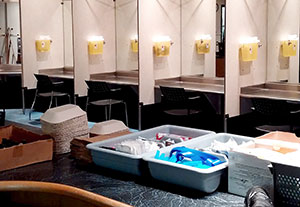
Facts concerning a proposed supervised consumption site in Somerville were presented and questions answered at a recent virtual town hall meeting.
By Camille Andersen
Somerville held its first of three virtual town halls on Tuesday, July 13, to facilitate the conversation about opening a supervised consumption site.
Supervised consumption sites are harm reduction interventions that provide clean and safe spaces for people to use substances with medical staff present who can intervene in an emergency.
Additional services are provided at supervised consumption sites, such as basic health care, housing support, and recovery services. Massachusetts has the eighth highest death rate from overdose among the states, which prompted Somerville to invest in strategies to prevent overdose death.
The town hall was moderated by Doug Kress, Director of Health and Human Services for Somerville. The event featured four harm reduction specialists: Rachel Bolton, Sarah Casey, Stephen Kelley, and TJ Thompson, in addition to Dr. Miriam Harris from Boston Medical Center.
The harm reduction specialists opened the town hall by providing an overview of the history of harm reduction in public health and emphasized that harm reduction was a movement led by people who used drugs.
Bolton and Thompson gave a statewide and national view of the need for programs such as supervised consumption sites. They emphasized that overdoses are preventable, and nobody has died at any of the 120 worldwide sites. “Everybody deserves a chance and one death is too many,” said Thompson. Currently, there are 100-150 overdose calls (fatal and non-fatal) annually in Somerville, but the panelists pointed out that these numbers do not reflect unreported overdoses.
Dr. Harris spoke about her experience working in and around supervised consumption sites in Canada. She explained that these sites can act as an entry point to seek other health services since places where services are currently offered have not always been welcoming to people who use drugs.
Harris also noted that 30% of people who have experienced a fatal overdose in Massachusetts have never used any health care service. “Safe consumption spaces are immediate evidence-based tools to reduce overdose and HIV/hepatitis transmission, but they are also an untapped resource to further provide an opportunity to engage people in all sorts of services,” she said.
After the initial overview of these sites, the town hall opened up for audience questions. The first question asked was what the site would actually look like and if people bring their own drugs. The panelists answered that the sites can look different depending on the community, but all have safe and sterile equipment and a medical area with staff to intervene if necessary.
People usually spend 20-30 minutes at the site, and there are privacy booths for each person. The facility will test drugs for the level of fentanyl to make sure people are informed and to prevent overdose.
In response to a question about whether there is evidence these sites reduce harm, Dr. Harris cited Canada’s decades long success with them and encouraged people to look at the report on Somerville’s website that contains a detailed description of evidence that these sites have been proven to reduce fatal overdose.
Several audience questions asked whether this site would draw in people from other communities to come here, known as the “honey pot effect.” Sarah Casey responded that the evidence refutes this and shows that people will plan to use a safer space but only within about a five-mile radius of where they are located.
The town hall wrapped up by explaining why this site would be beneficial to the community. Since traditional models are not meeting the needs of people who use drugs, they encouraged listeners to be open to thinking outside the box.
They noted that after extensive research, people who use drugs identified that the services they need are a place inside to use drugs in a safe space, mental health support, substance use treatment, and HIV care. The supervised consumption site would provide all these services. In response to these findings, Casey said that we as a community “must be willing to engage with people where they are at.”















Reader Comments